
January 25
1884 (Exact Date Unknown): Franziska Hitler develops tuberculosis and is sent away for treatment. Alois's 20-year-old niece, Klara Poelzl, moves in to help around the house. Klara, oddly enough, strikes up a friendship with Fanni and visits her often. [For further details, Click here.]
1918 Various: Volkishness: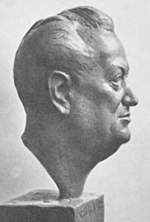
World War I: Rationing: To help deal with the shortage of meat caused by the war, the British government orders restaurants to have two meatless days per week.
At the start of the war, food shortages were self-imposed as the German U-boat campaign had yet to start. However, at the start of the war people went around panic buying food and hoarding it at home. Some shops sold out of food in days in August 1914. However, after the initial panic buying, people settled down into a routine and food was not a problem until the end of 1916. Britain continued to import food during the war. The main exporters to Britain were America and Canada. This meant that merchant ships had to cross the Atlantic Ocean. Up to 1916, these merchant ships could travel in relative safety. However, in 1917, the Germans introduced unrestricted submarine warfare and merchant ships were sunk with great frequency. This had a drastic impact.
1919 Various: The Versailles conference unanimously adopts a resolution to establish the League of Nations. After a committee is appointed to draft the League's Covenant, peace terms are hammered out by the Supreme Council, consisting of the heads of government and foreign ministers of the five principal Allied powers: the US, Britain, France, Italy, and Japan.
Antisemitism: The Protocols of the Elders of Zion: Typescript copies are distributed by anti-Bolshevik White Russians at the Versailles Peace Conference. They are also given to members of the U.S. Cabinet, judiciary, and intelligence agencies of the army and navy. (THP)
1920 Various: Holocaust: Weimar: Germany tells the Allies that it is in no position to extradite the 800 plus German citizens wanted for War Crimes. 1934 Albert Einstein visits with President Roosevelt at the White House: During the 1930s, Einstein spent several winters in the United States as a visiting professor at Caltech. In 1933, while he was abroad, Hitler came to power in Germany. That same year, Einstein accepted a permanent appointment at the Institute for Advanced Study at Princeton, and in 1941, he became a United States citizen.
1936 Holocaust: The Catholic Agency of Poland officially condemns antisemitic acts. (THP) 1938 The Gestapo is given the power to place prisoners in "protective custody" at its own discretion. 1940 World War II: Excerpts of a letter from Hermann Goering to Hans Frank: 1. In view of the present requirements of the Reich for the defense industry, it is at present fundamentally impossible to carry on a long-term economic policy in the Government General. It is necessary so to steer the economy of the Government General that it will, in the shortest possible time, accomplish results representing the maximum that can be secured out of the economic strength of the Government General for the immediate strengthening of our capacity for defense. 2. In particular the following performances are expected of the total economy of the Government General . . . . Supply and transportation of at least 1 million male and female agricultural and industrial workers to the Reich- among them at least 750,000 agricultural workers of which at least 50 percent must be women-in order to guarantee agricultural production in the Reich and as a replacement for industrial workers lacking in the Reich. 1942 World War II: Thailand declares war on the United States and England:
On this day, Thailand, a Japanese puppet state, declares war on the Allies.
When war broke out in Europe in September 1939, Thailand declared its neutrality, much to the distress of France and England. Both European nations had colonies surrounding Thailand and hoped Thailand would support the Allied effort and prevent Japanese encroachment on their Pacific territory. But Thailand began moving in the opposite direction, creating a "friendship" with Japan and adding to its school textbooks a futuristic map of Thailand with a "Greater Thailand" encroaching on Chinese territory.
Thailand's first real conflict with the Allies came after the fall of France to the Germans and the creation of the puppet government at Vichy. Thailand saw this as an opportunity to redraw the borders of French Indochina. The Vichy government refused to accommodate the Thais, so Thai troops crossed into French Indochina and battled French troops. Japan interceded in the conflict on the side of the Thais, and used its political alliance with Germany to force Vichy France to cede 21,000 square miles to Thailand.
On December 8, 1941, the Japanese made an amphibious landing on the coast of Thailand, part of the comprehensive sweep of South Pacific islands that followed the bombing raid at Pearl Harbor, Hawaii. The Japanese had assistance, though: Thailand's prime minister, Lang Pipul, collaborated with the Japanese, embracing the Axis power's war goal of usurping territory in China and ruling over the South Pacific. Pipul wanted to partake in the spoils; toward that end, he declared war on the United States and England. In October, he took dictatorial control of Thailand and became a loyal puppet of the Japanese. (History.com)
1943 Poland: From notes of a meeting at Warsaw between Hans Frank and Kruger: Kruger: We are removing those who constitute a burden in this new colonization territory. Actually, they are the asocial and inferior elements. They are being deported; first brought to a concentration camp and then sent as labor to the Reich. From a Polish propaganda standpoint, this entire first action has an unfavorable effect. For the Poles say: 'After the Jews have been destroyed, then they will employ the same methods to get the Poles out of this territory and liquidate them just like the Jews." Frank: "We must remember that we who are gathered together here figure on Mr. Roosevelt's list of war criminals. I have the honor of being Number One. We have, so to speak, become accomplices in the world historic sense."
1944 Wunderwaffen: Wernher von Braun visits Camp Dora, where slave laborers are employed in assembling his rockets. A friend of von Braun records that he said the following after this visit: "It is hellish. My spontaneous reaction was to talk to one of the SS guards, only to be told with unmistakable harshness that I should mind my own business, or find myself in the same striped fatigues! . . . . I realized that any attempt of reasoning on humane grounds would be utterly futile." This flies in the face of von Braun's future denials that he was aware of the horrific conditions. (Sellier, Stuhlinger, IMT) The German scientists led by Professor Wernher von Braun also saw everything that went on every day. When they walked along the corridors, they saw the prisoners' drudgery, their exhausting work and their ordeal. During his frequent attendance in Dora, Professor Wernher von Braun never once protested against this cruelty and brutality . . . . On a little area beside the clinic shack you could see piles of prisoners every day who had not survived the workload and had been tortured to death by the vindictive guards . . . . But Prof. Wernher von Braun just walked past them, so close that he almost touched the bodies. [See: Wunderwaffen: Hitler's Deception and the History of Rocketry.] 1945 World War II: Eastern Front: Hitler's big gamble, the Battle of the Bulge, collapses. The last of the German reserves are now gone. German forces in East Prussia are cut off and begin evacuations by sea using the cruisers Emden and Hipper (above), as well as a large number of passenger ships and almost the entire remaining surface fleet. Many fall victim to mines dropped by the RAF, and to submarines of the Soviet Baltic fleet. [See: The Last Days of the Third Reich.] From General Jodl's IMT testimony: I did not advise him (Hitler) to capitulate at that time. That was completely out of the question. No soldier would have done that. It would have been of no use...Not even after the failure of the Ardennes Offensive. The Fuehrer realized the situation, as a whole, as well as we did, and probably much sooner than we did. Therefore, we did not need to say anything to him in this connection ... there were many reasons for not doing this, apart from the fact that the question of capitulation or discontinuing resistance concerns only the Supreme Commander. The reasons against it were, primarily, that we had no doubt there could be only unconditional surrender, for tine' other countries left us in no doubt on that score; and even if we had had any doubt as to what faced us, it was completely removed by the fact that we captured the English 'Eclipse'—the gentlemen of the British Delegation will know what that is. 1946 Nuremberg Tribunal—Day 43: I. the undersigned, Madame Bondoux, supervisor at the prison in Bourges, certify that nine men, mostly youths, were subjected to abominable treatment. They remained with their hands bound behind their backs and with chains on their feet for 15 to 20 days; it was absolutely impossible for them to take their food in a normal way and. they were screaming with hunger. In the face of this situation several of the ordinary criminal prisoners showed their willingness to help these martyrs by making small packets from their own rations which I had passed to them in the evening. A certain German supervisor, whom I knew under his first name of Michel, threw their bread in a corner of the cell, and at night came to beat them. All these young men were shot on 20 November 1943. 1955 Peace: The Supreme Soviet officially ends the state of war with Germany. 1956 Cold War: Khrushchev declares that Eisenhower is "striving for peace": In a long interview with visiting American attorney Marshall MacDuffie, Soviet leader Nikita Khrushchev adopts a friendly attitude toward the United States and indicates that he believes President Dwight Eisenhower is sincere in his desire for peace. The interview was the precursor to Khrushchev's announcement later that same year that he wanted "peaceful coexistence" between the United States and the Soviet Union. [For further details, Click here.]
1972 Death: Erhard Milch: General Field Marshal, Armaments Chief of the Luftwaffe, and Goering's senior deputy who was half-Jewish (Mischling). After serving in an air force fighter group in World War I, Milch joined the Freikorps in 1919, and in 1920 commanded a Police Air Squadron in East Prussia. In 1926 joined Lufthansa and became a member of its Board of Directors and for the next seven years played a major role in the company's development. Joined the NSDAP in 1933 and that same year was appointed by Goering as State Secretary of the Reich Air Ministry, a position he would hold until the end of the Third Reich. The fact that his mother was a Jewess did not prevent his rapid promotion, since Goering persuaded his mother to sign a legal document stating he was not her child. In July 1940 he was promoted to General Field Marshal and in 1942 became the virtual dictator of transportation in Nazi Germany, along with his close personal friend and political ally, Albert Speer. Sentenced in April 1947 to life imprisonment as a war criminal by a Nuremberg Military Tribunal. In 1951 the American High Commissioner commuted his sentence to fifteen years. He was released and amnestied in 1954 and worked as an industrial consultant in Duesseldorf. Died at Wuppertal-Barmen.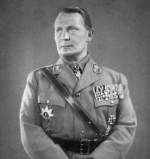

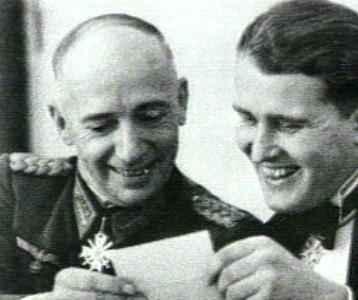


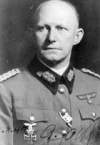
It was exact instructions about what the occupying power was to do in Germany after the capitulation. Now, unconditional surrender meant that the troops would cease to fight where they stood on all the fronts, and be captured by the enemy facing them. The same thing would happen as happened in the winter of 1941 at Viazma. Millions of prisoners would suddenly have to camp in the middle of winter in the open. Death would have taken an enormous toll. Above all, the men still on the Eastern Front, who numbered about 3+ million, would have fallen into the hands of the enemy in the East. It was our endeavor to save as many people as possible by sending them into the western area. That could only be done by drawing the two fronts closer together. Those were the purely military opinions which we held in the last stages of the war.
Continuation of M. Charles Dubost's Presentation of the case regarding atrocities committed in the occupied countries of the west.
Testimony of Maurice Lampe.
Then, too, a woman named Hartwig, who lived at Chevannes, I believe, told me that she had remained for 4 days bound to a chair. At all events, I can testify that her body was completely bruised. [For the full text of today's prceedings, Click here.]
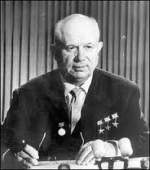
1981 Mao's widow sentenced to death: Jiang Qing, the widow of Chinese leader Mao Zedong, is sentenced to death for her "counter-revolutionary crimes" during the Cultural Revolution. [For further information, click here]
1995 Near launching of Russian nukes:
Russia's early-warning defense radar detects an unexpected missile launch near Norway, and Russian military command estimates the missile to be only minutes from impact on Moscow. Moments later, Russian President Boris Yeltsin, his defense minister, and his chief of staff were informed of the missile launch. The nuclear command systems switched to combat mode, and the nuclear suitcases carried by Yeltsin and his top commander were activated for the first time in the history of the Soviet-made weapons system. Five minutes after the launch detection, Russian command determined that the missile's impact point would be outside Russia's borders. Three more minutes passed, and Yeltsin was informed that the launching was likely not part of a surprise nuclear strike by Western nuclear submarines. [For further information, click here]
Edited by Levi Bookin (Copy editor) Click to join 3rdReichStudies FAIR USE NOTICE: This site may contain copyrighted material the use of which has not always been specifically authorized by the copyright owner. We are making such material available in our efforts to advance understanding of historical, political, human rights, economic, democracy, scientific, environmental, and social justice issues, etc. We believe this constitutes a 'fair use' of any such copyrighted material as provided for in section 107 of the US Copyright Law. In accordance with Title 17 U.S.C. Section 107, the material on this site is distributed without profit to those who have expressed a prior interest in receiving the included information for research and educational purposes. If you wish to use copyrighted material from this site for purposes of your own that go beyond 'fair use', you must obtain permission from the copyright owner. Please note that the list-owner and the moderators are not responsible for, and do not necessarily approve of, the random ads placed on our pages by our web server. They are, unfortunately the price one pays for a 'free' website.
levi.bookin@gmail.com






